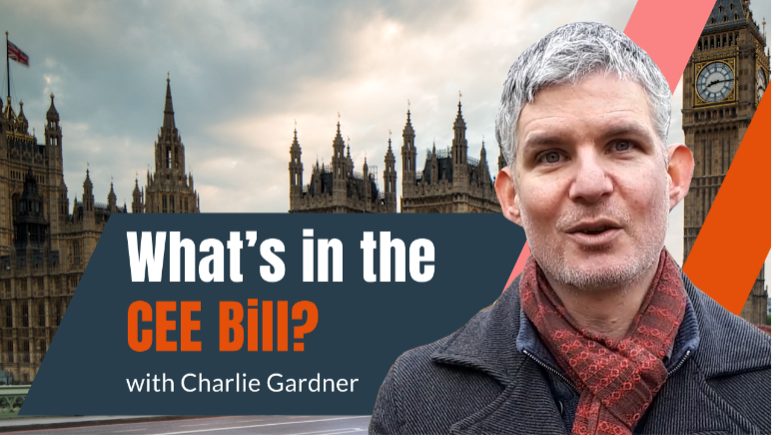The CEE Bill is the ‘Climate and Ecological Emergency’ Bill and is a Private Member’s Bill submitted to Parliament by Caroline Lucas, the Green Party Brighton MP. It seeks to update legislation to ensure we are acting upon the UK Government declared Climate Emergency. We caught up with Dr Charlie Gardner, one of the contributors of the of the CEE Bill to get to grips with the motivation behind it.
“The main motivation from the Bill is that we’re in an emergency and the legislation just isn’t up to the task. We have the 2008 Climate Act but that’s full of loopholes, so the idea was to update the Climate Act and close those loopholes. There’s essentially three main bits to the Bill, which you can see in the video. There is the climate bit, the ecological emergency bit, and then the ‘how are we going to do it’ bit, which is through citizens assemblies.”
Charlie pointed out that while there’s growing understanding of the Climate Emergency, there is a disconnect between understanding how the climate and ecological crises are two sides of the same coin. Whilst the climate emergency is what is already happening, and what is going to happen, because of climate change, the ecological crisis is the global loss of biodiversity and the loss of ecosystems due to a variety of reasons. To address one whilst ignoring the other is a fundamental flaw.
“We can’t address biodiversity without addressing climate change. Climate change is a massive threat to biodiversity, but we also can’t address climate change without conservation, because around 40% of our emissions are absorbed by ecosystems, by the ocean and by forests and other terrestrial carbon sinks. The concern is that what we’re seeing more and more is that emergency climate actions can have really negative impacts on biodiversity.”
“For example, ” Charlie continues “we have Drax power station. The UK’s largest power station is transitioning from burning coal to burning biomass, because that’s supposed to be more sustainable. A ‘climate solution’. But the biomass is wood pellets from old growth forests in South Carolina, so it is literally causing deforestation to try and reduce climate change. It is nonsensical, so it’s really important that we have joined up legislation to make sure that the actions that are taken to address climate change don’t have negative impacts on biodiversity, or vice versa.”
Charlie also describes how citizen’s assemblies can be used to improve existing decision making, as our governmental system is not built to make urgent and difficult decisions. This is in part due to the short termism, of the five-year electoral cycle, resultinhg in each governments having little freedom to make the difficult or controversial decisions needed for fear of being voted out of power. Furthermore, governments tend to answer to corporate lobbyists, not to scientists. Having a citizen’s assembly could empower politicians to make controversial or difficult decisions as they can place responsibility on ‘the People’ to save face and keep political power.
A further important part of this updated Bill is to close the loopholes in the previous Climate Act. This would mean taking responsibilities for the emissions produced offshore in making goods that are consumed in the UK. The government has claimed that the UK has reduced our emissions much more than we have, because we haven’t changed our consumption habits but have just moved production offshore and stopped claiming responsibility for those emissions. It is an important part of Climate Justice for the consuming countries to start to take responsibility for those offshore emissions that they cause, rather than placing the responsibility on developing and less wealthy nations.
Finally, we asked Charlie how hopeful he was that this Bill would be passed.
“Private Members Bills are difficult to get through. You need cross party support, and this means they take a while. They need to be discussed by Parliament, but there’s not much time allocated for discussing Private Members Bills, and then eventually they will come to vote. So private members bills don’t always become law.
“However, the 2008 Climate Act did start life as a Private Members Bill and we are following exactly the same model. So that was a Private Members Bill that was supported by a big public campaign called the Big Ask. And it worked and many of the same team that works on the Big Ask campaign and on drafting the Climate Bill that later became the Climate Act are working on the CEE Bill. So, we are following a successful model.”
“But personally, I’m quite hopeful. I’m quite hopeful as the Climate Bill does give me confidence that this is a model that can work and that the tide is really, really turning. The environment is the third biggest concern for British voters.”
Therefore, it is up to us to follow the example of the Big Ask campaign and make it known that we, the public, want the CEE Bill to be passed.
What can you do?
The CEE Bill alliance page has an army of resources for you to use.
- You can use the templates to write to your MP to give your support to the Bill.
- You can join in the social media campaign by recording yourself voicing your support for the Bill and tagging both your MP and the campaign in your post, and using the hashtag #CEEbill
- Petition your local council to pass a motion in favour of the Bill
Dr Charlie Gardner recently took part in a video explaining the CEE Bill, of which he is one of the contributors.

